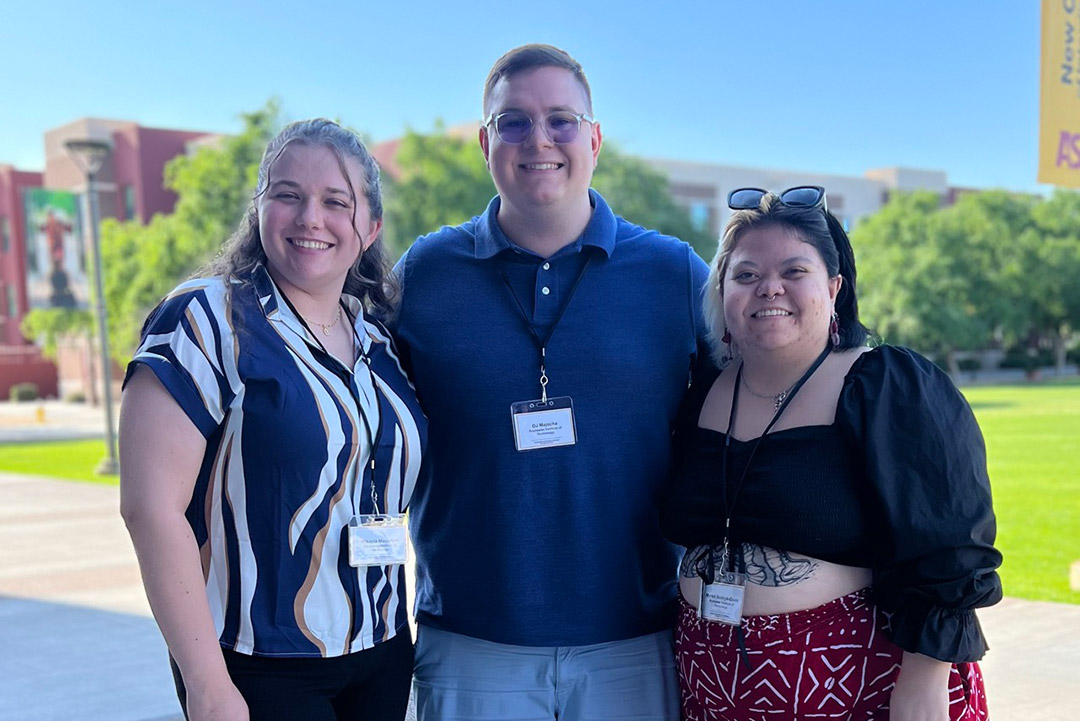RIT’s Expressive Communication Center students explore ableism in communication-focused settings
Group presented at national conference in Arizona
Elizabeth Reeves O’Connor
From left to right, RIT students Mikayla MacIntyre, DJ Majocha, and Myren Bobryk-Ozaki at the National Association of Communication Centers conference in Arizona.
RIT’s Expressive Communication Center students explore ableism in communication-focused settings Group presented at national conference in Arizona
Everyone communicates differently and, in a higher education setting, these differences should be celebrated. However, students and staff in RIT’s Expressive Communication Center (ECC) realized that some of their methods for assessing communication skills were putting students with disabilities at a disadvantage.
After speaking with students with disabilities in order to collect theirpersonal experiences during communication courses, ECC students presented their findings during the National Association of Communication Centers conference in Arizona, April 11-13. The goal is to encourage discussions of ableism and accessibility within communication settings among a wider audience.
Myren Bobryk-Ozaki, a fourth-year communication major from San Diego, Calif., ECC consultant, and e-board member of RIT’s Disability Culture Club, discussed the importance of the research project and panel.
“We’re hoping to get more of a dialogue about accessibility and communication going,” said Bobryk-Ozaki. “This panel is not for us to be the experts. It's for us to present the space for people to share ideas and come to an understanding that ableism is prevalent in a lot of the things we do.”
For example, certain aspects of rubrics for presentations can be stressful and difficult for certain individuals. Maintaining eye contact, a strong posture, time limits, and being told to speak loudly and clearly are all aspects of communication that are challenging for many students with disabilities or other issues. The ECC staff hope their research will help faculty create more inclusive rubrics in the future.
The panel, “Confronting Ableism at the Center,” looks at ways to dismantle ableism and promotes inclusion with public speaking instruction, peer consulting, and assessment. The presentation aims to reduce the stigma faced by neurodivergent, disabled, deaf, and hard-of-hearing populations and ensures that speech instruction empowers those divergent voices.
“For this panel, we gathered some of those initial discussion points and shared our findings to determine what other communication centers have done to confront ableism in their training policies, and to have a conversation among a wide range of different colleges and institutions to try to benefit our center and other centers, in general,” explained Mikayla MacIntyre, a fourth-year applied statistics and data analytics major from Shirley, N.Y., and an ECC consultant.
In addition to presenting their research at the conference, the ECC students also learned from other communication centers around the country. The students hope their research and experience at the conference can contribute to RIT’s pursuit of equity and acceptance.
“RIT is such an inclusive environment and communication is not always the most inclusive to everybody,” MacIntyre said. “We wanted to do some preliminary research and start trying to make the ECC more accessible.”
At the conference, RIT student DJ Majocha was awarded the National Communication Association (NCA) Outstanding Graduate Tutor Award for his work as a communications consultant.












